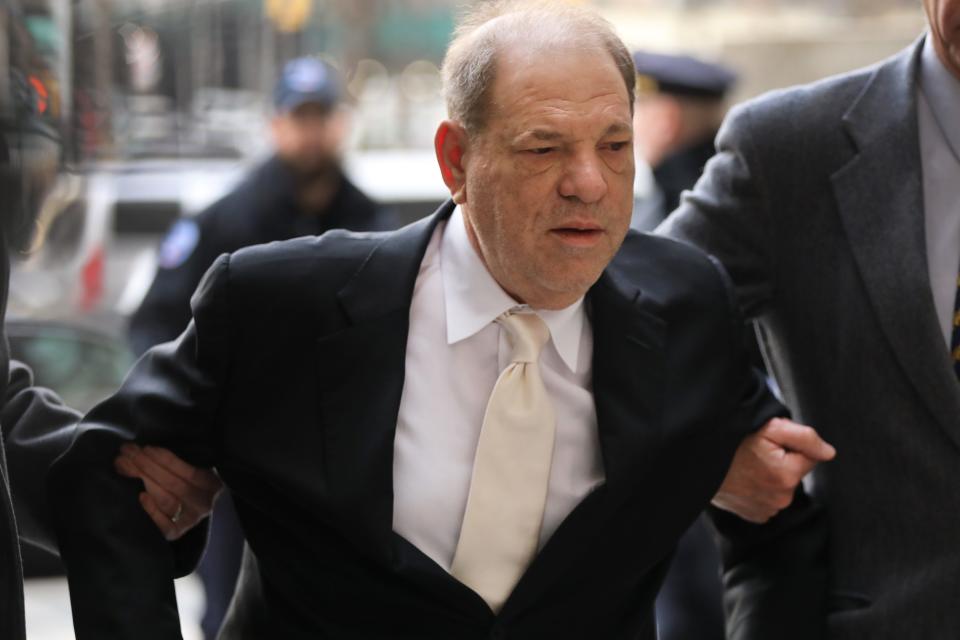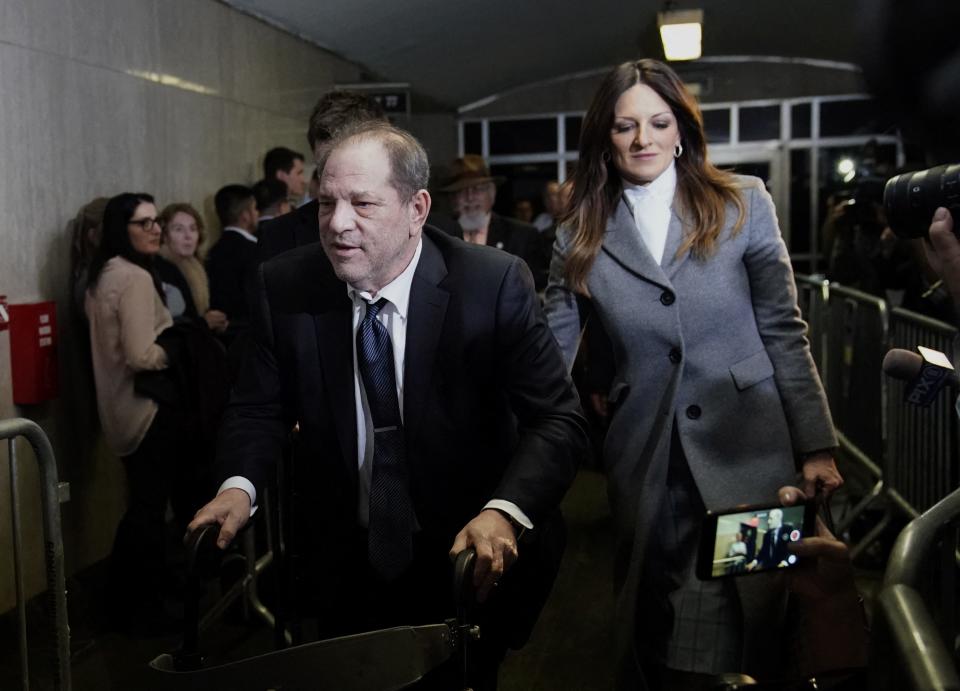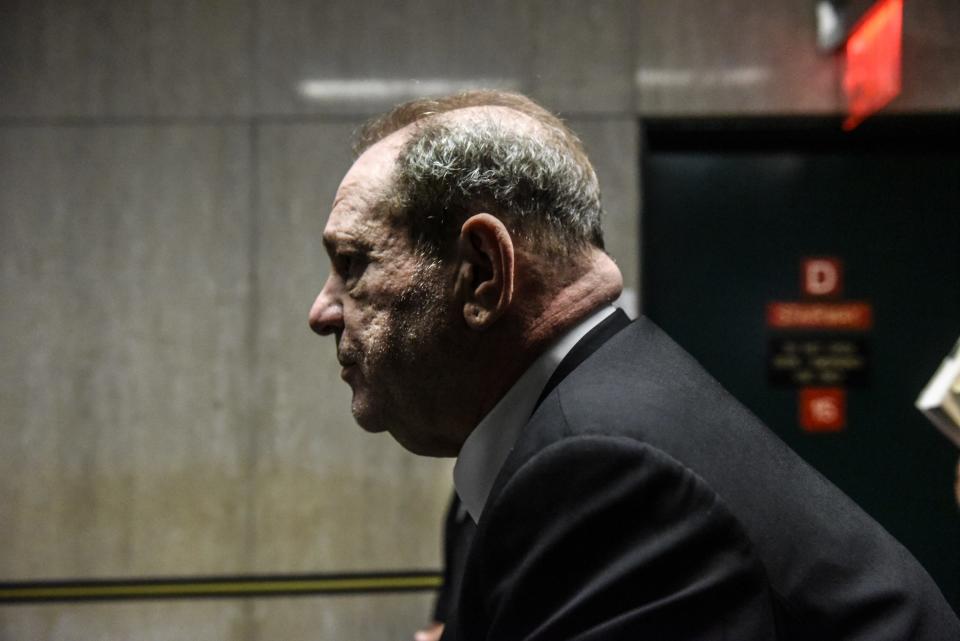Harvey Weinstein's conviction tossed in stunning reversal. What does it mean for #MeToo?
NEW YORK ? Harvey Weinstein, the disgraced Hollywood mogul whose 2020 rape conviction catalyzed the #MeToo movement, may soon get his day in court ? again.
On Thursday, a New York appeals court overturned his conviction on the grounds that testimony provided by women who had not brought cases against Weinstein could have prejudiced the jury against him.
Weinstein’s lawyers hailed the decision, with attorney Arthur Aidala telling reporters outside Manhattan Criminal Court that “the law was not applied fairly.”
Others condemned the ruling as legal maneuvering that will make it harder for victims of sexual assault.
“The decision is wrong,” Douglas Wigdor, who represented eight Weinstein accusers, told USA TODAY. “The evidence was important to show the defendant’s motive and intent.”

While few experts argue with the legalities of the ruling, advocates for sexual abuse victims lament the signal it sends.
“It is reassuring that the law is capable of self-correction when human error clouds the process,” says Juliet Williams, professor of gender studies at the University of California-Los Angeles. “At the same time, it is profoundly disheartening to live under a legal system that continues to fail victims of sexual violence.”
The testimony of women who had been abused by Weinstein but were not part of the lawsuit was relevant and vital, says Ann Olivarius, attorney with McAllister Olivarius, a New York- and London-based law firm.
“The women who reported being raped by Weinstein, those women are terrified,” she says. Which is why, she argues, it was important to allow the testimony of others with “information about reputation.”

The #MeToo movement that was ignited by Weinstein's accusers not only brought about the Hollywood power player's conviction but led to Pulitzer Prize-winning reporting and high-profile companion movies such as 2022's "She Said," about the New York Times reporters who dogged Weinstein and convinced his victims to speak out.
For those who work with victims, the court ruling "reflects the vast challenges survivors face in seeking justice, (but) we cannot let a single case outcome be seen as a measure of #MeToo,” says Laura Palumbo, spokesperson for the National Sexual Violence Resource Center. “The movement will still have strength and purpose until healing and justice are more accessible.”
The ruling Thursday does not mean freedom for the producer, who leveraged his power to abuse women – from unknown assistants to stars such as Gwyneth Paltrow, Salma Hayek and Ashley Judd ? who sought advice and opportunities from the Miramax boss, whose movies minted legends and won slews of Oscars.
On Thursday, Judd wrote in her Instagram Stories: "This is unfair to survivors. We Live In Our Truth. We know what happened."
Weinstein will likely be transferred to California, where he was convicted of rape in 2022 and received a 16-year sentence. His New York conviction got him 23 years in prison.
What does Harvey Weinstein's case overturn mean for his California conviction?
Legal experts say the appeals court decision is most likely to send a signal to judges and prosecutors in future cases, cautioning both about the potential inadmissibility of their witnesses.
“Zealous prosecutors will try and bring in everything that can help their case, which just means that it’s up to the judge to slice and dice what’s appropriate,” says Peter Pullano of Albany, N.Y.-based firm Tully Rinckey.
“Jurors in this case likely knew that Weinstein was a bad guy based on things they had heard or read,” he says. “But when you’re in criminal court, the analysis has to be limited to the charges at hand, not to whether the defendant is a bad guy by reputation.”
Few lawyers anticipate the reversal in Weinstein’s case to lead to other #MeToo convictions being revisited.
“I don’t see this decision having precedential impact on other such cases,” says Neama Rahmani, president of the Los Angeles-based West Coast Trial Lawyers. “For one, it was a slim majority in the New York case (a 4-3 decision). And New York law doesn’t control California and other state laws.”

If anything, experts say the appeals court ruling will simply force lawyers to dig deeper into their own state’s laws before bringing forward testimony that could backfire, says Jamie White, a Michigan lawyer whose past clients have included those who suffered abuse at the hands of the Catholic Church and Team USA gymnastics coach Larry Nassar.
“In general, a defendant’s prior bad acts are not admissible ? there are many exceptions and they vary from state to state,” says White, who describes Thursday’s ruling as a “setback for victims of crimes in general.”
White says that while defendants are not “being tried on everything they’ve ever done in their lives,” when past behavior is part of a pattern, as was the case with Weinstein’s decades of abuses, the inclusion should be carefully considered.
In its ruling, the appeals court judges wrote that “the trial court erroneously admitted testimony of uncharged, alleged prior sexual acts against persons other than the complainants of the underlying crimes. The remedy for these egregious errors is a new trial.”
White says the use of the word “egregious” is “overreach," "this is not a cut-and-dried matter at all.”
But, he adds, he does not expect the decision to “change the #MeToo movement.”
If and when a new Weinstein trial is ordered in New York, it remains to be seen how many of his accusers will want to go through the legal ordeal again.
Says Wigdor: "Every time a survivor recounts their story, it’s re-traumatizing. Now there’s also the trauma of the decision being overturned after all their hard work and effort.”
But at least one Weinstein accuser – Mimi Haley – stands ready, said her attorney, Gloria Allred.
“Although victims have lost this battle, they have not lost the war,” Allred said in a statement. “We will continue to fight for justice for victims both in criminal and civil cases until there is a fair trial.
"Not just for the accused but also for those who allege that they are victims of sexual predators.”
Contributing: Eduardo Cuevas, Naledi Ushe, Taijuan Moorman and Brendan Morrow, USA TODAY
This article originally appeared on USA TODAY: Harvey Weinstein rape conviction overturned: What it means for #MeToo
